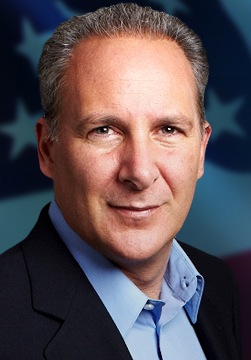The Real Lesson from Katrina
Apparently, New Orleans residents believed that their situation was the exception that proved Murphy’s Law. Though the inability of New Orleans' levee system to withstand a Category-4 hurricane was apparently widely known, rather then doing something preemptive to fortify it, the people and their government decided to do nothing and hope for the best. So each year, they played a version of Hurricane Russian Roulette, and until 2005, the cartridge was always empty. Over the years those expressing concern about the potential for just such a disaster were likely labeled as being "fear mongers," "Chicken Littles," or "Gloom and Doomers," and their warnings likely dismissed, both due to the dire nature of their forecasts, and the number of years that had passed without consequence.
Unfortunately the situation in New Orleans is a microcosm of our nation as a whole. Although our reliance on foreign savings and production are widely known, and most economists accept the fact that a real economic disaster would ensue should foreigners discontinue such subsidies, dump their hoards of U.S. treasuries, and refuse to exchange real goods for paper dollars. However, rather than perusing policies to rebalance our economy, we simply do nothing, and hope that day of reckoning never arrives.
Politicians, of course, never think past the next election. Diverting resources to fortify levees in advance of a potential hurricane would not have garnered Louisiana bureaucrats many votes. Similarly, allowing a recession to run its course today to prevent a more severe one from developing in the future finds few supporters on Capital Hill.
However, just as that strategy backfired in New Orleans, so too will it for America as a whole. The financial equivalent of Hurricane Katrina is currently forming in the East, and our economic levees are just as vulnerable as were their real counterparts in New Orleans. As Katrina takes its toll on the U.S. economy, potentially prompting the Fed to ease off on much needed, and long over-due, interest rate hikes, another "conundrum" is likely to develop. Just as a series of quarter point rate hikes did not produce a much anticipated corresponding rise in long-term yields (the conundrum,) the cessation of such increases ironically might. Just when the Fed wants to help the economy by not raising short-term rates, the market may finally do the opposite, by moving long-term rates much higher. It has been the anticipation of future rate hikes that has been propping up the dollar. Remove that prop, and the Fed's rate-cutting levee will fail, as it will be overwhelmed by a storm surge of foreign selling.
I confess to feeling a bit like a nerdy New Orleans environmental planner, warning that our economic levees are mere facades, while the party-loving citizenry of the Big Easy, operating under a delusion of invincibility and the false premise that something that hasn't gone wrong won't, continues to ignore my cries. Our situation as a nation, as was the case with New Orleans, is analogous to a man jumping from the top of the Empire State building. The "so far so good" crowd maintains that as long as he has yet to hit the pavement, all is well. The reality however, is that once the jumper's feet leave the ledge, his fate is sealed. Hitting the pavement is a forgone conclusion, merely completing not defining the process.
My advice to investors/savers is not to jump in the first place. Climb off the ledge by downloading my free research report "The Collapsing Dollar: The Powerful Case for Investing in Foreign Equities" at www.researchreport1.com
September 8, 2005
Peter D. Schiff
President/Chief Global Strategist
Euro Pacific Capital, Inc.


















